- トップページ
- 日本国内での取り組み
- JICA中部
- 「人」明日へのストーリー
- Japan for Papua New Guinea (Mr. Sylvester ROKUMAN - Part 2) ~Interview to JICA Long-term Participant~

JICA Long-term Training Program Participant (JICA Scholarship for Graduate Student)He belongs to Graduate School of Engineering, Nagoya Institute of Technology.(JICA Scholarship: SDGs Global Leaders Course 2019)He is from Independent State of Papua New Gu
Mr. Sylvester ROKUMAN
We interviewed Mr. Sylvester ROKUMAN from Graduate School of Engineering, Nagoya Institute of Technology, one of the Long-term Training Program Participants at JICA Chubu. (Part 1~4)
(Interviewer: Mieko ARAKI, Training Program Division, JICA Chubu)
Please tell us what made you decide to study in Japan.
In 1999, when I was in grade 6 in a community school, I was only 12-years old when my dad gave me application forms to fill and come to study in Japan. The courses offered covered all areas from science and technology to humanities. I was just a child, so I didn’t take it seriously at that time. Over the years, my dad kept insisting that I be trained by the Japanese for reasons he never told me.
His parents (my grandparents) were children during the World War II and in those days, the Japanese soldiers had captured and established their base in my area of Papua New Guinea (PNG). The presence of the Japanese in that area left a lasting impact on my people even to this day. In fact, Japanese soldiers were the first to introduce rice to my people for the first time. To my group of people, the Japanese are heroes
In 2006, I made it to the PNG University of Technology and during the orientation program, my supervisor (a Papua New Guinean) made it aware to us that Japan had been producing some of the best civil engineers in Asia Pacific Region. As a young undergraduate and coming from a background of people who are fond of the Japanese, it was such a motivation for me.
After graduating with a degree in civil engineering in 2013, I eventually got an offer to work with the PNG Department of Transport in a joint project with the Japanese Government through JICA PNG. This project enabled me to work with a team of Japanese experts from the Overseas Coastal Area Development Institute (OCDI) of Japan.
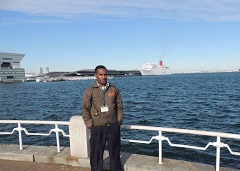
Yamashita Park, Yokohama, 2017
This was the beginning of my close connection with the Japanese people. Due to this engagement, my formal working experience was greatly influenced by Japanese experts. Coming from a background of Japanese-influenced family, my engagement with the Japanese experts was a special encounter for me, personally. Like my dad, I began to grow fond of the Japanese ways and lifestyle. This experience increasingly influenced my interest in coastal & ocean engineering as I was getting more exposed to the field through these experts.
After concluding the JICA project in November of 2017, I was engaged on other local projects, employing the skills I developed during my engagement with the Japanese experts, doing port feasibility studies for four proposed port developments in PNG. These projects were undertaken from 2018 to 2019. When a scholarship opportunity for a master's program was offered to my office from JICA PNG, I was nominated by my superiors to take the scholarship which resulted in me being here today.
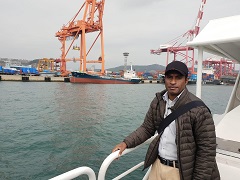
Site Visit at Busan Bay in South Korea, 2019
Therefore, the short answer to your question is that the idea of studying and learning in Japan was a life-long desire. It is a dream that eventually became a reality for me and for my people, especially my parents. I’m sure that today, my dad is the happiest person. I owe it all to the good people of Japan for making this opportunity possible for me. For sure I will have a lot to tell to my people when I return home.
You mentioned that your grandparents were singing some Japanese songs to you. Could you tell us more about it?
Unfortunately, my grandparents passed away before I reached 5-years of age so I do not remember the actual songs they sang and I didn’t have time to learn from them, but my grandmother was conversant with Nihongo as told to me by everyone who knew her.
I come from an island called ‘Muschu’ just off the coast of Wewak in the East Sepik Province of PNG. This entire area was captured by the Japanese soldiers in WWII. In fact, my island home was used as a prison camp where prisoners of war were kept. Airstrips were built along the coast, camps were set up, schools were built and earth (bulk) wharves were built for war and supply ships. My grandparents were children in those days and were caught amidst the war, eventually attending these Japanese schools.
Most of that generation had passed on by now, but their stories and experiences are still told today. There are so many war relics today in my village as well as the surrounding area which have become tourist attractions. Even live bombs are still going off in this era where the latest one went off in 2016 while someone was digging and accidentally hit it buried several inches below the surface of the earth.
Having said the above, it is evident that the people in my area of PNG still and will always have some deep historical connection with the Japanese due to the continuous reminder of their history embedded into the environment in war remains which they encounter on a daily basis. They even openly talk about it in regular conversations and community or family gatherings because it is part of their history. In fact, former Japanese Prime Minister, Shinzo Abe, visited the war memorial sites in my area in 2014 with his lady. They were both accorded a red-carpet welcome coupled with historical and traditional performances of our history with the Japanese.
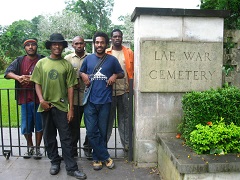
With friends at War Cemetery in Lae, PNG (Syl-san is the second from right)
Therefore, my grandmother is just one of the many who were taught and influenced by the Japanese and they influenced their children down the generations.
* This edition, we learned the Japanese influence to his life and PNG. Next time, we will share his research and Japan’s assistance to PNG!
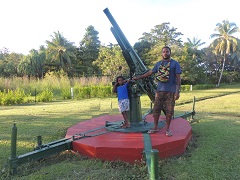
With a local girl standing on a Japanese machine gun located in his hometown in a war memorial, PNG




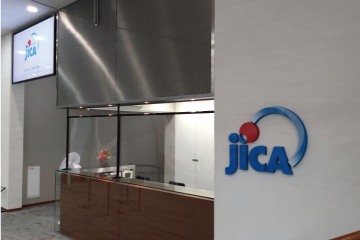

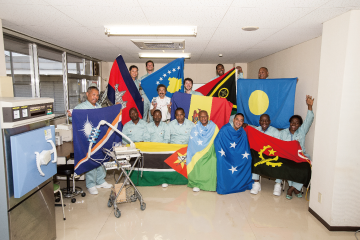

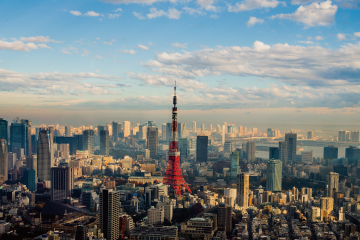



scroll